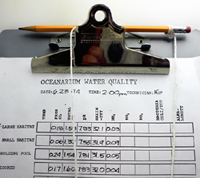Documentation, documentation, documentation
 Documentation has come a long ways over the years, but its importance is still often overlooked.
Documentation has come a long ways over the years, but its importance is still often overlooked.
A couple of weeks ago, I realized, “If I’m going to be sitting at my desk doing freelance work every day, then I want a comfortable chair.” So off I went to Office Depot to find something comfortable and inexpensive.
After getting it home, it was time to assemble it. I opened the box and separated the parts, finally giving the instructions a brief glance. About halfway through the ordeal, I realized that some of the screws were slightly longer than others. I rolled my eyes and looked again at the documentation, realizing that I had failed to note the difference, a difference that was clearly shown in the instructions.
I was impressed, not because I had failed to fully read the instructions, but because the documentation was clear and concise. Every part had its own letter assignment, and the diagrams of the screw sizes were to scale. If I had taken the time to read through the brief instructions in full, I would have probably saved five minutes of assembly time.
My experience was different than many others though. People have pulled hair out trying to put “peg A” into “adapter B” or have thrown a wrench through a window in a fit of assembly rage. Standup comics have created whole routines based on the trials and tribulations of horrible installation instructions. Yet, the art of documentation has made progress over the years, saving already balding people like myself a few extra hairs along the way.
Documentation is considered part of the field of information science. Documentation isn’t reserved only for instructions; it includes any academic or professional discipline that requires the clear and concise detailing of information. Educational training materials, scientific journals, and just about any book written require some level of documentation.
Documentation is important. In fact, there is a journal called the Journal of Documentation dedicated solely to the purpose of providing a voice for those dealing with recorded information. The editor, David Bawden, was asked how information research is benefited by “a historical perspective”, saying: “It helps us understand technological change. When a new technology such as the Internet comes along, you think that you need a new way of looking at it. But in fact a lot of the things that were said about printing in the 16th and 17th century are similar to what’s now being said about the Internet — that it is an isolating force, may provide poor quality and offensive material, and so forth. So a historical perspective reminds us of what is invariant over time, and provides us with a perspective to analyse.”
Maintaining perspective is often difficult to do in our fast-paced world. Technology becomes obsolete quickly, leaving many people out of touch when standards and practices change in an effort to keep up. But it’s important to keep in perspective the changes that have affected the process of not only documentation, but also the science that depends on it. While it’s easy to take documentation for granted, it’s difficult to deal with the consequences of poor documentation. Without proper documentation, we wouldn’t have safe medicines, functional software, or cable television.
So whether a new vaccine is being researched or a video game is being distributed to the masses, it’s important to remember the role that documentation — or the lack thereof — has had on our lives. Quality documentation means the new vaccine being tested will be handled properly; poor documentation means that video game you just bought will be more frustrating and difficult to grasp.
Leave a Reply